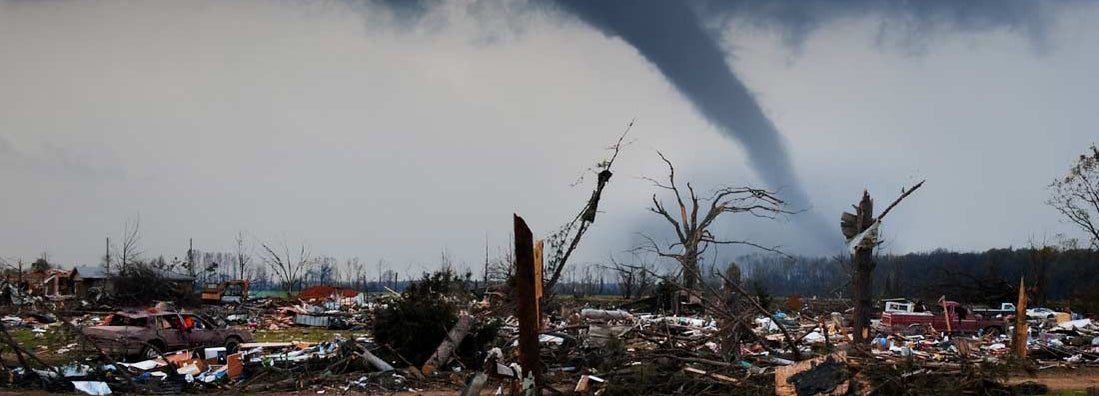West Virginia Tornado Insurance
Your home, business and vehicles, you can withstand the cost of wind damage without emptying your savings.

Although the U.S. sees more tornado touchdowns than any other region on earth, West Virginia ranks low among the 50 states for twister sightings, averaging only two per year. However, history proves that the state is not immune to devastating wind damage. With the right tornado insurance on your West Virginia home, business and vehicles, you can withstand the cost of wind damage without emptying your savings. If you aren't sure whether you have enough coverage or need quotes on a new policy, a local agent can provide the information you need.
Use our independent agent matching system to find the best insurance plan in your area. You tell us what you’re looking for, and our technology will recommend the best agents for you. Any information you provide will be sent to only the agents you pick. We do not sell to third parties.
West Virginia's Deadliest Tornado Outbreak
- The most deadly tornado to touch down in WV was an F4 in 1944.
- The tornado killed 151 people and leveled hundreds of houses.
- It was part of a group of slightly smaller F3 tornadoes destroying thousands of homes and causing millions of dollars in damage.
The vast majority of tornadoes that touch down in West Virginia are F1 or F2 tornadoes according to the Fujita scale. This means they reach wind speeds between 73 and 157 miles per hour. This is moderate by the standards of the Fujita scale, but it is still strong enough to rip roofs off houses or snap large trees.
Tornado Insurance for Your West Virginia Home
With wind speeds up to 250 mph and paths as wide as a mile, a tornado can leave devastating loss in its wake. You can mitigate financial loss by making sure you have enough of the right coverage for your belongings, whether you own or rent your home.
Coverage for Homeowners
Most homeowners policies include coverage for damage from strong winds and do not need separate endorsements for tornadoes. This also covers damage from flying debris, which is the biggest cause of injury and destruction when a twister touches down near residential areas. It is a good idea to make sure your homeowners policy carries sufficient coverage for the following, which can come in handy after a major storm:
- Medical payments to help cover the cost of treatment for your injuries
- Structural damage to help with the cost of roof repair, broken windows, walls and doors for your house and outbuildings
- Property damage to repair or replace belongings, such as electronics, furniture, clothing and appliances
If you would like insurance for the replacement cost of your belongings, rather than the actual cash value, it can be well worth the slight increase in premiums. Actual cash value accounts for depreciation, so even if you cover all of your major items, you only receive compensation for their current value. To replace your belongings with new items of the same quality, you may need to use savings or credit. Replacement value coverage pays to purchase new items of identical quality to the original items.
Coverage for Renters
If you rent your home, the landlord's insurance policy can cover tornado damage to the structure of your apartment, townhouse or single-family home. However, it is your responsibility to insure the contents of your home, such as your furniture, electronics, kitchenware, small appliances and other items.
A typical renters policy can provide coverage for these items, up to a certain dollar amount. The standard coverage limit for renters insurance is $20,000, which is the average value of the property most people keep in the home. If you have expensive furniture or other valuable items like artwork, collectibles or musical instruments, you may need to increase your coverage limits and add separate riders for high-ticket items.
Tornado Insurance for Your Car
West Virginia state law only requires that you carry liability coverage for your car or truck. However, if flying debris, falling trees, hail or strong winds damage your vehicle, liability coverage will not help you repair or replace your vehicle. To do this, you need comprehensive coverage.
Comprehensive vehicle insurance covers non-collision damage, such as theft, vandalism and storms. If you financed your car, you may be required to carry comprehensive coverage to meet the lender's insurance requirements. A local agent can look over your policy with you if you aren't certain.
It may be a good idea to opt for replacement value coverage instead of actual cash value coverage if you can afford it. This will help to ensure that you can replace your vehicle with a brand new one if a tornado or other disaster destroys the vehicle.
Tornado Insurance for Your Business
Protect Your Property
If you have a typical business insurance policy, your buildings and property probably already have protection against strong winds, hail and debris. You may need to inventory your equipment and merchandise from time to time to make sure your coverage limits are high enough. This is especially true after major purchases, additions and mergers.
Protect People
A local agent can help you evaluate your coverage limits and can look over your liability coverage to make sure you have tornado coverage if a client or guest suffers injuries on the premises during a storm. Additionally, you can prevent potential injury to employees and customers by making a company disaster plan that includes the following suggestions:
- Map out the safest spots in each building to wait out a tornado or hurricane, and make sure employees are ready to relay this information to customers when the need arises.
- Send one or two employees to a CERT training course to learn disaster readiness, first response and rescue protocols, and CPR.
- Keep first aid kits stocked and available at strategic locations in each building.
- Make sure each building is equipped with a battery-powered radio and flashlights.
Protect Your Income
You may benefit from business interruption insurance, which compensates you for lost income while you close down for storm-related repairs. Many businesses that close after being destroyed by a fire or storm never reopen because of mounting costs and lack of revenue. Business interruption insurance can keep you afloat and save you from resorting to debt to cover expenses after a disaster.
Tornadoes and Floods
The peak of West Virginia's tornado season falls in June, usually accompanied by strings of thunderstorms and heavy rainfall. That means that where tornadoes strike, floods can follow. Most policies do not cover natural flooding. To protect against the cost of damage caused by excess rainfall, creek overflows and broken river levees, you need a flood insurance policy from the National Flood Insurance Program. Coverage is available for homeowners, renters and business owners across the U.S. You can check with a local agent to see if flood insurance is available to your community.
Get Quotes on the Tornado Insurance You Need
Whether you are purchasing a new policy or reviewing your current coverage from time to time, a local agent can help you feel certain that you have enough tornado insurance to protect your West Virginia home and assets. Independent agents in the Trusted Choice® network can find coverage from many different insurance providers. A local agent can evaluate your coverage needs with you and can help you find quotes on a policy that fits your needs and your budget.
Contact an agent in your area to get started.
